Ok, I have four tables:
Table 1: "f_withholdings"

Table 2: "f_wh_list"

Table 3: "f_rpayments"

Table 4: "f_rp_list"

Table 1 and Table 2 are connected with each other by wh_id field
and Table 3 and Table 4 are connected by rp_id as seen in picture.
I want to union select both tables into one, something like:
SELECT
`wh_list_id`,
`wh_name` AS `name`,
`wh_list_date` AS `date`,
`wh_list_amount` AS `amount`,
`wh_list_pending` AS `pending`,
`wh_list_comment` AS `comment`
FROM
`f_wh_list` LEFT JOIN `f_withholdings` ON `f_wh_list`.`wh_id` = `f_withholdings`.`wh_id`
UNION ALL
SELECT
`rp_list_id`,
`rp_name` AS `name`,
`rp_list_date` AS `date`,
`rp_list_amount` AS `amount`,
`rp_list_pending` AS `pending`,
`rp_list_comment` AS `comment`
FROM `f_rp_list` LEFT JOIN `f_rpayments` ON `f_rp_list`.`rp_id` = `f_rpayments`.`rp_id`
and I get this:

there is only one id field from first SELECT wh_list_id in result table, but no rp_list_id
I'd like to have both ids in result table, something like below:

Thanks!